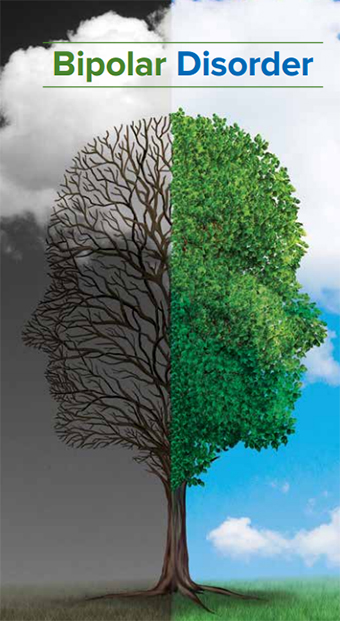
Bipolar disorder, formerly called manic depression, is a mental health condition that causes extreme mood swings that include emotional highs (mania or hypomania) and low (depression).
People with bipolar disorder have periods or episode of:
- Depression – feeling very low and lethargic
- Mania – feeling very high and overactive (less severe mania is known as hypomania)
Symptoms
Symptoms of Bipolar Disorder depend on which mood the person is experiencing. Unlike simple mood swings, each extreme episode of bipolar disorder can last for several weeks (or even longer), and some people may not experience a “normal” mood very often.
Bipolar disorder can look very different in different people. The symptoms vary widely in their pattern, severity and frequency. Some people are more prone to either mania or depression, while others alternate equally between the two types of episodes.
Some have frequent mood disruptions, while others experience only a few over a lifetime.
Common signs and symptoms of Mania Episode include;
- Feeling unusually “high” and optimistic or extremely irritable
- Unrealistic, grandiose beliefs about one’s abilities or powers
- Sleeping very little, bu feeling extremely energetic
- Talking so rapidly that others can’t keep up
- Racing thoughts; jumping quickly from one idea to the next
- Highly distractible, unable to concentrate
- Impaired judgement and impulsiveness
- Acting recklessly without thinking about the consequences
- Delusions and hallucinations (in severe cases)
Common signs and symptoms of bipolar depression include;
- Feeling hopeless, sad, or empty
- Irritability
- Inability to experience pleasure
- Fatigue or loss energy
- Physical and mental sluggishness
- Appetite or weight changes
- Sleep problems
- Concentration and memory problems
- Feeling of worthlessness or guilt
- Thoughts of death or suicide
Diagnosis
To determine if a person has bipolar disorder, the evaluation may include;
- Physical Exam – the doctor may do a physical exam and lab tests to identify any medical problems that could be causing the symptoms
- Psychiatric Assessment – the doctor may refer the person to a psychiatrist, who will talk to the person about their thoughts, feelings and behavior patterns. They may also fill out a psychological self-assessment or questionnaire.
- Mood Charting – the patient may be asked to keep a daily record of their moods, sleep patterns or other factors that could help with diagnosis and finding the right treatment
- Criteria for Bipolar Disorder – the psychiatrist may compare the patient’s symptoms with the criteria for bipolar and related disorders in the Diagnostic and Statistical Manual of Mental Disorders (DSM-5), published by the American Psychiatric Association.
Treatment
Treatment is best guided by a medical doctor who specializes in diagnosing and treating mental health conditions (psychiatrist) who is skilled in treating bipolar and related disorders. The patient may have a treatment team that also includes a psychologist, social worker and psychiatric nurse.
Bipolar disorder is a lifelong condition. Treatment is directed at managing symptoms. Depending on the patient’s needs, treatment may include;
- Medications – often, the patient will need to start taking medications to balance their moods right away.
- Continued treatment – bipolar disorder requires lifelong treatment with medication, even during periods when they feel better. People who skip maintenance treatment are at high risk of relapse of symptoms or having minor mood changes turn into full-blown mania or depression.
- Day treatment programs – the doctor may recommend a day treatment program. These programs provide the support and counseling the patient needs while they get the symptoms under control.
- Substance abuse treatment – if a person has problems with alcohol or drugs, they will also need substance abuse treatment. Otherwise, it can be very difficult to manage bipolar disorder.
- Hospitalization – the doctor may recommend hospitalization if the person is behaving dangerously, feel suicidal or they become detached from reality (psychotic).
The primary treatment for bipolar disorder includes medications and psychological counseling (psychotherapy) to control symptoms, and also may include education and support groups.
What We Offer
We at Almurshidi Medical Tourism will find the best doctors to cater to your needs. We are partnered with a wide network of hospitals and clinics that provide top quality medical experience.
We provide free medical estimates, make medical appointments, and provide several medical opinions if needed at no cost.
Contact Us
For more information contact us at +66822004040 or via WhatsApp





